 Paul Robeson (1898-1976) was an African-American singer, actor and prominent political campaigner. Robeson was initially active in the civil rights movement. He became a supporter of communism and was blacklisted during the 1950s. Robeson was born in New Jersey, the son of a former plantation slave turned Presbyterian minister. He attended high school in Somerville and excelled in his studies, as well as drama, singing, football, athletics and other sports. After graduation Robeson attended Rutgers College; as its only black student, he was subject to racist taunts and victimisation. While at Rutgers he gained accolades for his sporting prowess, being twice named on the All-American college team. After finishing at Rutgers Robeson obtained a law degree, though he found it difficult to obtain regular work because of his race.
Paul Robeson (1898-1976) was an African-American singer, actor and prominent political campaigner. Robeson was initially active in the civil rights movement. He became a supporter of communism and was blacklisted during the 1950s. Robeson was born in New Jersey, the son of a former plantation slave turned Presbyterian minister. He attended high school in Somerville and excelled in his studies, as well as drama, singing, football, athletics and other sports. After graduation Robeson attended Rutgers College; as its only black student, he was subject to racist taunts and victimisation. While at Rutgers he gained accolades for his sporting prowess, being twice named on the All-American college team. After finishing at Rutgers Robeson obtained a law degree, though he found it difficult to obtain regular work because of his race.
In the early 1920s, Robeson continued his involvement with music and drama, performing in amateur and semi-professional productions. His deep bass singing proved enormously popular and led to a string of offers, initially in the theatre. In 1928 Robeson starred in the London production of Show Boat; a booming rendition of the song Ol’ Man River became his signature performance. He later played the title role in Othello, a character generally accepted to be black but usually played by white actors. Robeson was signed by Hollywood and appeared in several films, however, he shied away from the movie business, decrying its stereotypical use of African-Americans in simple and caricatured roles. During the 1930s Robeson became more interested in African history and culture, as well as left-wing politics. He visited the Soviet Union in 1934-35, praising its attitude to race: “Here I am not a Negro but a human being… I walk in full human dignity”.

During World War II Robeson became one of the United States’ most popular entertainers, performing live, on radio and occasionally in films. He continued his political activism, promoting racial issues and anti-colonial movements, even meeting president Harry Truman to demand he take action against lynching. In the first years of the Cold War Robeson attracted the attention of the Federal Bureau of Investigation (FBI), both for his public statements and his membership of “subversive organisations”. In 1949 Robeson spoke in Paris, suggesting that African-Americans should not volunteer for a war against the Soviet Union. This speech led to his blacklisting in the US. Robeson’s records were withdrawn from sale, television and radio slots were abruptly cancelled, his college sporting feats were erased from history, while the State Department withdrew his passport. Unable to leave the country, Robeson performed for British audiences by singing over the telephone.
Robeson’s passport was restored by a 1958 Supreme Court decision. He returned to performing abroad and highlighting the plight of oppressed people, including black South Africans living under apartheid and indigenous people in Australia and New Zealand. In the United States Robeson continued to endure negative publicity and propaganda, some of it circulated by government agents. His health deteriorated in the 1960s and Robeson withdrew from the public eye, making only a handful of appearances for the civil rights movement. He spent his final years living with family in New York City and Philadelphia, until his death in January 1976.
Content on this page is © Alpha History 2018-23. This content may not be republished or distributed without permission. For more information please refer to our Terms of Use.
This page was written by Jennifer Llewellyn and Steve Thompson. To reference this page, use the following citation:
J. Llewellyn et al, “Paul Robeson”, Alpha History, accessed [today’s date], https://alphahistory.com/coldwar/dean-acheson/.
